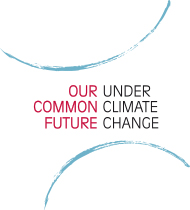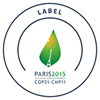�
Our Common Future Under Climate Change
International Scientific Conference 7-10 JULY 2015 Paris, France

Posidonia/Arnaud Abadie
In the Mediterranean sea, the only certainty is change
201507-29
By By Arnaud Fache and Johanna Sadik
Climate change will strongly affect nutrients carried along Mediterranean Sea streams, impacting this biodiversity hotspot in ways scientists are not yet able to predict.
�We are seeing surface water stratification impacting dense surface water formation and uplift of nutrients from intermediate and deep waters,� said Richard Semp�r�, CNRS researcher and director the Mediterranean Institute of Oceanology (MIO) and presenter at the Our Common Future Under Climate Change conference.
�The Mediterranean Sea is like a miniature size ocean�[this phenomena] will affect the ecosystems, changing the species observed in this part of the sea," he said.
�Global change is happening, and it is happening fast. The only certainty we have is that marine ecosystems will be different, but we still do not know to what extent.��
Stretching for 46,000 kilometres, the white sandy beaches and sparkling waters of the Mediterranean Sea only make up 1% of world oceans. But what it lacks in size, it makes up for in diversity - the Mediterranean counts over 10% of all known species, has the second highest percentage of endemic species in the world and is home to several endangered marine species like the monk seal and green turtle. Mediterranean Sea is also under the influence of river waters and atmospheric inputs.
But the land locked waters are also one of the most populated and polluted regions of the globe.
�We have observed pollutants in all the living organisms studied,� said Semp�r� who is also one of the primary investigators of an interdisciplinary research oceanographic project ��Marine Ecosystems Response in the Mediterranean Environment (MERMEX)�, part of the MISTRALS program.
Keeping this plethora of marine species alive is a phenomenon known as the oceanic �conveyer belt�. Like a giant conveyer belt, currents slowly turn over water in the ocean, moving warm surface waters downward and forcing cold, nutrient-rich waters upward. This increases the development of phytoplankton, which is at the centre of the marine food chain.�
"The [conveyer belt] phenomenon is critical. Current models show that climate change will decrease water-cooling and the upwell of nutrient salts, but the extent is still unknown,� says Semp�r�.
This type of stream is currently really strong on the western part of the Mediterranean Sea, but climate models show that it is going to move eastward towards the Aegean Sea.
How will these Mediterranean ecosystems evolve in the coming century with such changing human and natural pressures? This is a key question that the MERMEX Programme is trying to address.�
Living species have a limited tolerance to temperature rise and acidification of the water. Some species will die, others will migrate north, and new species will arrive from the Atlantic Ocean and the Red Sea, Semp�r� says.
Difficult data
To reliably predict ecosystem changes, marine scientists have been studiously developing models.
They start with controlled laboratory experiments where they expose a species to changes, say in temperature or salt concentration and record how it reacts. They then conduct fieldwork by using oceanographic ships, drones and profilers to observe whether such reactions are taking place in the natural world. Using fancy mathematics, they can input this data and develop a model that when exposed to a hypothetical future change, can calculate the potential impact of that change. (As there is an inevitable existing margin of error, predictions made are not a hundred percent certain.)
But reliable measurements are not always easy to obtain in the marine world.
"Sometimes, by the time we obtain enough data, the first measurements are too old to be significant,� Semp�r� said.
�There is a continuous flow of data that feeds the model, improving it day by day. The more data gathered, the more accurate the model becomes and the better our understanding of the marine environment will be.�
Collecting accurate data is important for public policy enforcement. For example, once environmental scientists were able to identify the significant impact a pollutant was having on marine ecosystems, governments were able to ban the pollutant from use. �
As scientists work to better understand the impacts of climate change on Mediterranean Sea streams, we hope that they can work with government to help this important ecosystem adapt and thrive well into the future.
A mid-term progress evaluation of MERMEX will be presented in Marseille in October 2015.�
Arnaud F�che is trained as an engineer & landscape architecture designer. He is currently working as a freelance landscape architect in Nantes, France and is a PhD candidate (civilisation, landscape architecture & urban agriculture) with University of Nantes. Arnaud is a volunteer social reporter at the #CFCC15 conference.�



